
Photo by Avi Richards on Unsplash.
Remote working has become increasingly popular in recent years—even after the pandemic, many companies continue to offer the option to work from home or anywhere with an internet connection. This has opened a world of possibilities for remote workers, who now have the freedom to choose where they want to work, live, and explore.
But with so many options, it can be difficult to know where to start. In this guide, we’ll look at the 9 best places to work remotely in the USA, and what makes them great for remote workers who want to explore new areas, connect with nature, and go on new adventures.
What makes a city good for working remotely?
Before choosing a new destination to work from, it’s important to think about what makes a city an attractive destination for working remotely. Although this list is by no means all-inclusive, here are some considerations:
(1) Reliable and fast internet: For most, remote work requires a stable and fast internet connection, so a city that has good internet infrastructure is essential. Thankfully, throughout the past handful of years, this has become a less limiting factor in many parts of the United States.
(2) Affordable cost of living: Working remotely away from home can quickly get expensive. With more flexibility with where to live, a city with a relatively low cost of living is especially attractive.
(3) Access to coworking spaces: Many remote workers do not have access to a dedicated office space, so a city with a variety of coworking options can be beneficial.
(4) Recreational activities: With more work schedule flexibility, remote workers may have more time for adventurous activities, so a city with a variety of recreational options can be appealing. Remote workers may appreciate easy access to nature, whether it be nearby parks, beaches, mountains, or lakes, to break up the day or to enjoy during leisure time.
(5) Cultural activities and a diverse population: Remote workers may want to live in a city with a diverse population to experience new cultures. Even within the United States, cultural diversity is incredible, providing remote workers a variety of unique cultural and social experiences, including food, music, and visual arts.
(6) Vibrant startup scene: By nature, many remote workers are in the tech and other innovative fields, so enjoy being in cities with thriving startup scenes. Something often missed by “digital nomads” (remote workers who travel constantly while working) are the strong opportunities to expand their networks while moving from city to city—getting to know new professionals, especially similarly-ambitious startup addicts, can be very valuable.
(7) Nightlife and social scene: Remote workers tend to be younger professionals who are looking for cities with strong nightlife and plenty of other people close in age with similar interests. Making new friends while remotely working in a new city will provide a much better experience. Finding a strong coworking space can be a good way to meet new people.
(8) Transportation: Before visiting a new remote work destination, it’s a good idea to plan transportation. Will it be easy to get to the desired workspaces and explore the city and nearby attractions?
(9) Climate: For remote workers from a cold region with long winters (like me, currently writing this from Minnesota), finding warmer weather for a few weeks in January or February can be reenergizing. Luckily, in the United States, remote workers can easily access a wide range of climates at any given time, whether that be a snowy mountain or a warm beach.
Savannah, Georgia:
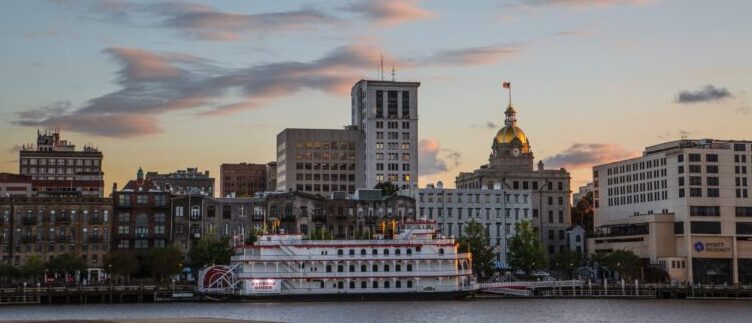
Photo by Avi Richards on Unsplash.
With just about 150,000 residents, Savannah has a big name to live up to. The city is well known for its historic Colonial and Georgian architecture, beautiful waterfront, and fun nights. Even though Savannah is a popular tourist destination, it is known to be affordable.
Unsurprisingly, paired with great amenities for young remote workers, Savannah has become a popular destination for remote workers to relocate. This has resulted in a strengthening startup and coworking community.
Who it’s for: Cost-conscious remote workers who want to enjoy the Southern lifestyle near the coast (40 minutes to Hilton Head), while having access to strong nightlife.
Denver, Colorado:

Denver is a great place for remote workers because of its beautiful natural surroundings and outdoor activities. The city has a growing tech scene (thanks, Boulder) and a huge selection of cafes and coworking spaces to work from. Denver is also home to the Denver Startup Week, the largest free entrepreneurial event of its kind in the United States, so if you can attend while visiting the area, that’s a bonus.
Who it’s for: Remote workers who want to be close to the Colorado Rockies (weekend skiers and hikers) with the comforts of a large city (~3 million people in Denver Metro).
Durango, Colorado:
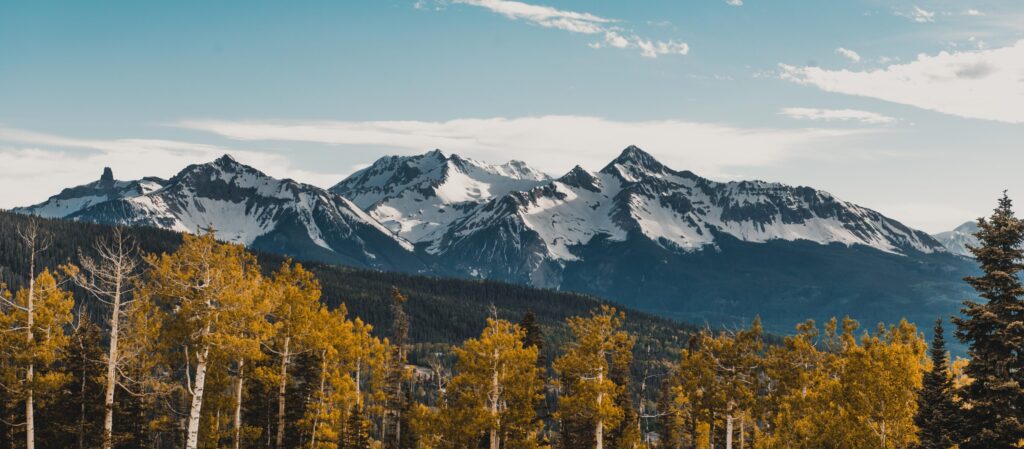
Photo by John Fowler on Unsplash.
Although Denver can be a great spot for those who want to take frequent trips to one of Colorado’s 32 ski resorts or one of the thousands of hiking trails in driving distance, being near Denver makes it difficult to escape crowds. Because the drive to the ski hill can be a bit long out of Denver, especially with winter weather and traffic, skiers and summer hikers who want access to quieter parts of the Colorado Rockies should consider staying in a mountain town away from Denver like Durango.
Extended stays at ritzy ski resorts like Aspen and Vail are out of most people’s budgets and won’t help you avoid crowds during busy seasons. Durango is a good alternative with access to more affordable and less crowded housing, skiing, and hiking. Surprisingly, there are quite a few coworking options in Durango and, unsurprisingly, many good cafes to work from.
Who it’s for: Colorado mountain bums on a budget; it’s about two hours to Telluride, the ski resort with the biggest vertical drop in the United States (4,425 feet).
Asheville, North Carolina:
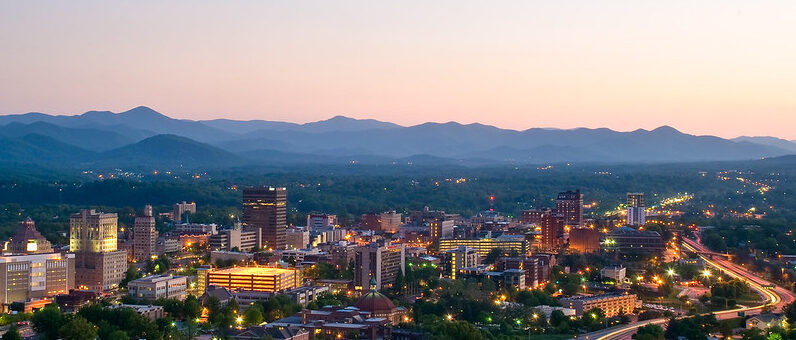
By Michael Tracey - https://www.flickr.com/photos/mogmismo/15445314911/, CC0, https://commons.wikimedia.org/w/index.php?curid=86840589
Home to the Biltmore Estate, Asheville is a relatively small city of about 100,000 people surrounded by the beautiful Blue Ridge Mountains and Pisgah National Forest. Asheville is a unique blend of the following:
- Many well-known breweries… often called “Beer City USA”
- Number 1 Food City in the U.S. according to Yelp
- Thriving arts, including 30+ galleries and plenty of live music
- A friendly Southern town with real Southern charm
- An outdoorsy mountain feel
Asheville, also referred to as “The Land of the Sky”, is slightly more expensive than the national average but clearly has a lot to offer remote workers.
Who it’s for: Beer, food, and art lovers who want to experience the distinctive beauty of the Smokies.
Bozeman, Montana:
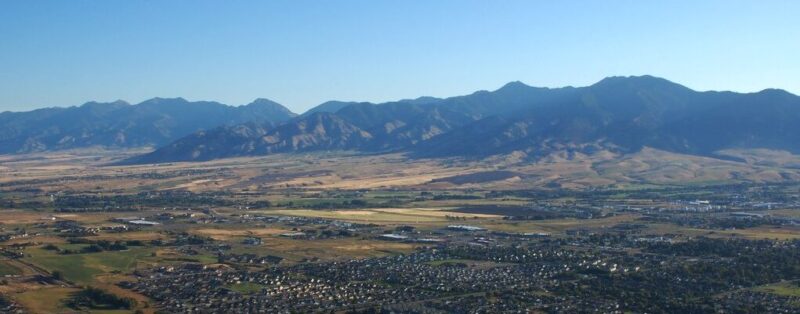
By Michael Tracey - https://www.flickr.com/photos/mogmismo/15445314911/, CC0, https://commons.wikimedia.org/w/index.php?curid=86840589
Staying on the mountain theme, Bozeman is a remote town. It is fairly small but has seen dramatic growth since the beginning of the pandemic (a population of 55,000 as of 2021). This has resulted in a growing startup scene, unfortunately leading to a quickly rising cost of living. In fact, according to payscale, Bozeman is now over 20% more expensive than the national average.
Bozeman is a great place for remote workers who want to connect with nature. The town is surrounded by the beautiful Bridger Mountains, the Gallatin National Forest, and is located in between Glacier National Park and Yellowstone. This offers endless outdoor activities such as hiking, skiing, and fishing, especially for those who want to take weekend adventures.
And thanks to Montana State University and the new energetic residents flooding the area, Bozeman has a relatively good nightlife scene.
Who it’s for: Remote workers who obsess over nature and mountain recreational activities.
Austin, Texas:
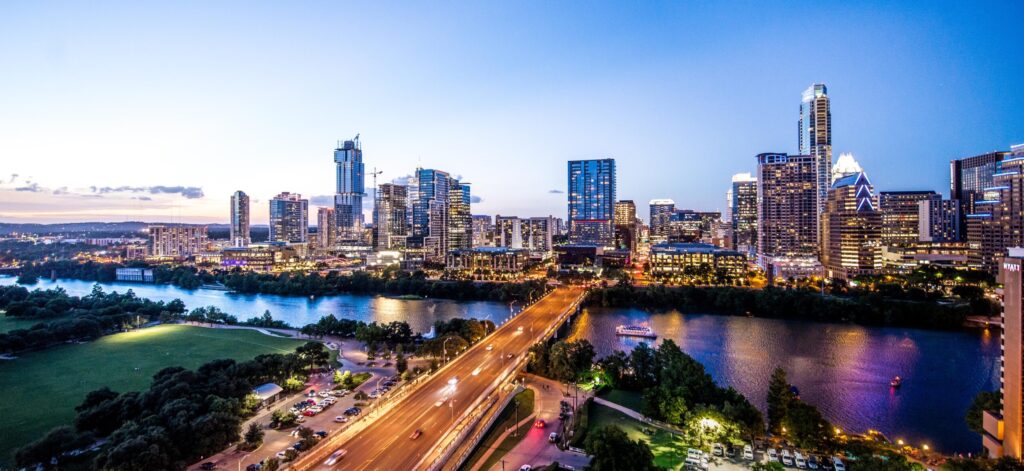
Photo by Carlos Alfonso on Unsplash.
Known as the “Live Music Capital of the World,” Austin is a great place for remote workers who love music and culture. The city has an exploding tech scene and countless workspaces for remote workers. Foodies will also appreciate Austin, as it was recently named a top 5 foodie city in the U.S. by WalletHub.
Although Austin used to be an affordable large city, in recent years, it has become much more expensive. Nonetheless, Austin is a must for remote workers who want to experience an invigorating tech startup scene while exploring its 250+ live music venues.
Who it’s for: Live music lovers, foodies (no shortage of Tex-Mex and barbeque), tech startup geeks, and those who want mild winter weather.
San Francisco (and Silicon Valley), California:
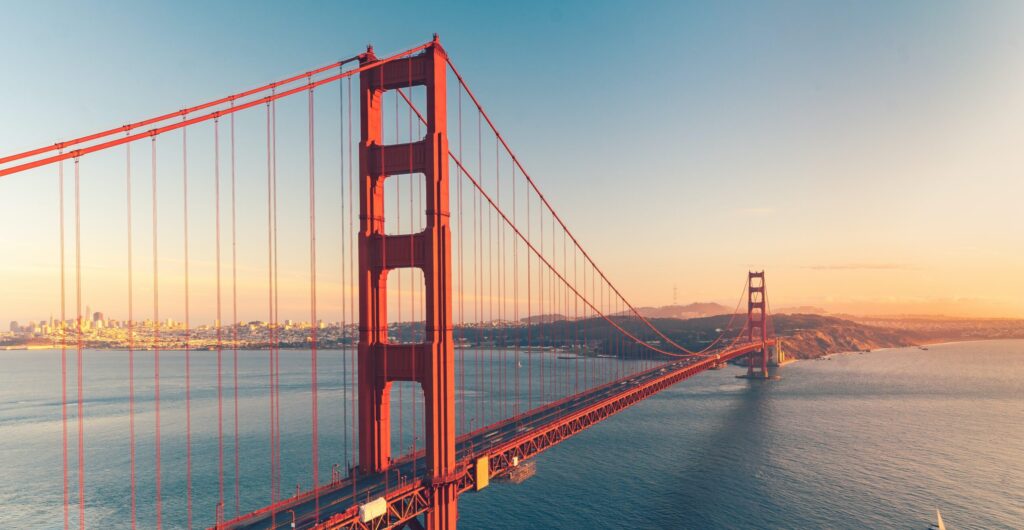
Photo by Varun Yadav on Unsplash.
San Francisco is a great place for remote workers who want to be in the heart of the tech industry and build a strong network in the Silicon Valley ecosystem. Even though the area has lost some of its appeal in recent years as the remote work revolution allowed many to leave the city’s high prices and crime, it remains an incredible place for anyone with high-growth startup ambitions. Furthermore, the nearby red wood forests and dramatic coastlines make this an outdoor explorer’s dream. But beware, prices remain high here.
Who it’s for: Startup founders who need to build a strategic network for partnerships and big-time funding.
Taos, New Mexico:

Photo by Raisa Nastukova on Unsplash.
San Francisco is a great place for remote workers who want to be in the heart of the tech industry and build a strong network in the Silicon Valley ecosystem. Even though the area has lost some of its appeal in recent years as the remote work revolution allowed many to leave the city’s high prices and crime, it remains an incredible place for anyone with high-growth startup ambitions.
Furthermore, the nearby red wood forests and dramatic coastlines make this an outdoor explorer’s dream. But beware, prices remain high here. Taos is a small remote town of under 7,000 people that is surrounded by the beautiful Sangre de Cristo Mountains and Taos Ski Valley. This is a great destination for anyone who wants to reconnect with nature and get away from it all.
Who it’s for: Remote workers who want to be truly remote in the Southern Rockies.
The Twin Cities, Minnesota (Minneapolis and St. Paul):
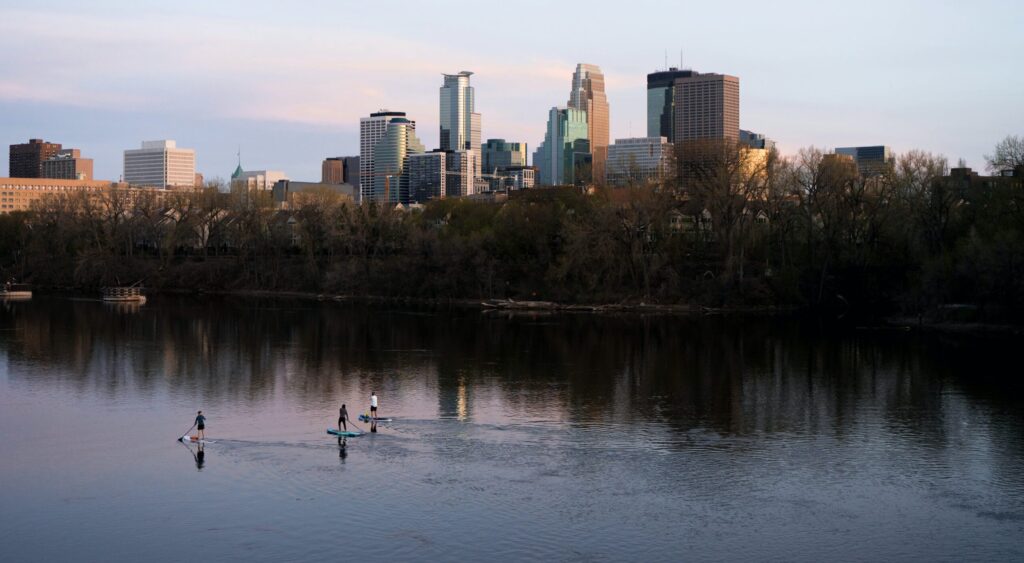
Photo by Lucas Ludwig on Unsplash.
The Twin Cities is a great place for remote workers who want a high quality of living at reasonable prices. Home to both Minneapolis and St. Paul (metro population of 3.7 million), the area boasts one of the best park systems in the nation with access to limitless bike and walking trails, public outdoor hockey rinks (winters only), and freshwater lakes.
But if you don’t like the cold, it’s best to avoid the Minnesota winters—spend some time working remotely from Minnesota when the days are long, and the clear blue lakes are warm. And if you’re a fisher or water lover, plan to spend a weekend or two in Northern Minnesota where you will be welcomed by small cabin towns surrounded by loons, bald eagles, and still waters with an abundance of tasty walleye.
Furthermore, the Twin Cities offers many convenient workspace options for remote workers. If you need a spot to work in the Southwest Metro, you’re welcome at Olio Coworking in Hopkins, MN!
Who it’s for: Anyone who wants to experience Midwest living while surrounded by parks, friendly Minnesotans (Minnesota nice is a real thing), and, of course, lots o’ lakes.
Conclusion: Best US Cities for Remote Work
Whether you’re a remote worker looking for a new place to call home or just looking for a change of scenery, the places above are worth considering. With that being said, remember that for remote workers, the world of possibilities is endless—that’s the beauty of remote work.
No matter your interests, you can find a place that’s worth exploring.